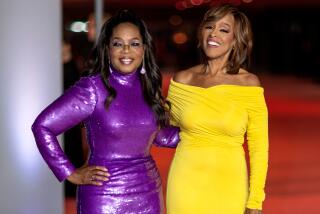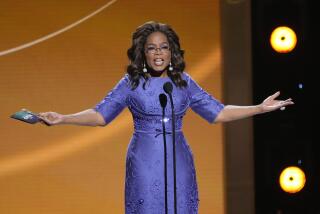Scenes With Oprah : How the popular talk-show host pulls it off, every day and now in prime time
- Share via
CHICAGO — “One of my greatest assets is knowing I’m no different than the viewer. I consider myself a surrogate viewer.”
--Oprah Winfrey
Oprah Winfrey, arguably one of the most successful people in the history of television, said the most difficult thing about preparing for her first network prime-time special was being nervous about meeting Dustin Hoffman.
“I’ve always been terrified of meeting celebrities,” she said, thinking back to her less-than-successful days as a Nashville TV news reporter in the mid-’70s in Nashville and a cattle-call interview assignment to get the scoop on Priscilla Presley’s latest project--whatever it may have been.
Winfrey was already knock-kneed, waiting for her five minutes with Presley, when an imperious public relations type came up and told Winfrey she could ask Presley anything, but she couldn’t mention Elvis.
“Couldn’t mention Elvis!” Winfrey wailed, remembering painfully. “Five minutes with this woman and I couldn’t mention Elvis? I went in there and basically went “buh, buh, buh’ until they carried me out.”
Luckily, Hoffman, who was never married to Elvis, was not as difficult an interview for Winfrey.
“He was very nice,” she said. “Much funnier than I expected. It turns out he’s always been a prankster all his life--loved practical jokes.
“In school, he was the type of kid who would arrange for everyone in the class to drop their books all at the same time, when the clock hit a certain minute. He asked me if I would have gone along with the joke if I’d been in his class. I said, “No, I’d have told on you.”
Winfrey cupped her hands around her mouth and shouted, as if to the fourth-grade teacher: “Oh, Miss Stagg!” and burst out laughing.
“Dustin said, ‘I hated you in school.’ ”
In fact, Winfrey said, she felt comfortable with all the guests on her Tuesday night ABC special: Goldie Hawn, whom she already knew and admired; Meryl Streep, who impressed her with the depth of her feeling for her children; and Michael Bolton, who had already enjoyed a tremendous career boost thanks to Winfrey. (After appearing on her show once, Bolton’s sales of “Time, Love and Tenderness” skyrocketed from 50,000 to 500,000 weekly.)
At the suggestion that her guests might have been nervous at the prospect of encountering her, Winfrey seemed completely taken aback.
After all, Winfrey represents a staggeringly large audience, who are by all accounts strongly influenced by her opinions. If she were to drop a few unkind words ...
Winfrey brushed off the suggestion. “People know I’m not that kind of person,” she said. “No one would be afraid of me.’
After achieving such phenomenal success with her daytime program, why has Winfrey taken on this new challenge in prime time? Especially given her supposed reticence about celebrities?
“There’s always room for the next level of personal development,” she said, nodding her head as if to acknowledge the truth of her own words. “There’s always room for growth.”
Translate that into Latin and it would work well as a motto on a Winfrey family crest. Accelerated growth has been a consistent theme in her life, ever since she persuaded her first teachers to skip her from kindergarten to the first grade and then to second grade.
“Also, I thought it would be fun and interesting and challenging to talk to very famous people about their lives,” she said. “I think once you remove that fame shield, you have just folks.”
Winfrey, 38, apparently has been doing a lot of thinking about fame these days--especially how it relates to her. She has experienced her share of the ill effects of fame, after all, notably the incessant attention paid to her by the tabloids--a subject she dismisses by referring to them as “verbal pornography.”
(Winfrey and her longtime boyfriend Stedman Graham have enjoyed a victory of sorts over the scandal merchants recently, winning a defamation suit against the Montreal-based News Extra, which printed a story alleging that Graham had an affair with his male cousin. The paper folded up shop and failed to appear in court.)
“If you come to fame not understanding who you are, it will define who you are,” Winfrey said. “It shouldn’t change you. If you’re a jerk, you just get to be a bigger jerk.
“What fame does is magnify who you are and puts that out on a platter for the whole world to see.”
For that reason, Winfrey is always conscious of hanging onto the values and lessons she learned early in life, primarily from her cherished grandmother, a very moral and religious woman who believed in the laying on of hands and the occasional laying on of the strap.
Winfrey herself is a religious woman, though not a proselytizer, with a strong sense of spiritual purpose. Reportedly, she kneels to say her prayers each night before sleep and silently repeats Bible verses when she begins to lose patience with people. (Her own unusual name is a misspelling of the Old Testament name Orpah in the book of Ruth.)
“I had good roots,” Winfrey says. “I was given good values. I was taught to care about other people.”
That quality of caring may go a long way toward explaining Winfrey’s phenomenal appeal with the television audience.
How phenomenal? Leaving aside the fact that she is only the third woman and the first black in the United States to own a major film and television studio, Winfrey’s ratings success is nothing short of mind-boggling.
Now in its sixth year of syndication, “The Oprah Winfrey Show” has held the No. 1 position among daytime talk shows for 22 consecutive ratings periods. Each day, an average of 14 million viewers tune in to “Oprah,” according to Nielsen ratings. (Winfrey says a bit sourly that the figure is probably closer to 20 million because Nielsen doesn’t factor in enough black viewers.)
The Los Angeles area alone makes up for a fair amount of that daily figure. An average of 500,000 households tuned in “The Oprah Winfrey Show” during the first nine days of the current May sweeps ratings period--the survey period when local stations pull out all the stops to attract viewers.
During the last complete ratings survey, in February, “Oprah” trounced the competition in Los Angeles with characteristic ease, drawing a 27 share of all households with televisions turned on during her time slot. Phil Donahue was her closest competitor, with a 12 share, followed by Maury Povich with a 6.
Most remarkable of all, “Oprah” ended the February sweeps ranked No. 1 in her time period in each of the top 25 television markets in the United States.
Winfrey works out of Harpo, the $20-million studio she bought in 1988 after she assumed ownership of her talk show from CapCities/ABC. By all accounts, she could afford it. Her cut of the syndication revenues from “Oprah” reportedly reaches $40 million annually.
She begins about 6:30 a.m., arriving for makeup and wardrobe before taping two shows and personally shaking hands and saying goodby to more than 500 guests. (“It’s more memorable than an autograph.”)
The day generally ends at 10 p.m., following story meetings, meetings with attorneys and meetings with producers, advisers and accountants. She still signs every Harpo check personally--a tip she picked up from Bill Cosby.
This particular day was one day after the taping of her post-riot shows in Los Angeles. It was nearly 5 p.m. and Winfrey was between appointments, leaning back in her chair, shirt-tails out over a pair of loose black slacks and her socked feet propped up on her power desk.
The large mahagony desk is the most prominent feature of her private office, an inner sanctum with elegant peach and beige decor complete with flocked wallpaper and thick, soft carpet.
But the character of the room is softened by many personal touches. A dozen or so framed photographs of family and friends, including Graham, Quincy Jones and her mentor, author Maya Angelou. Rounding out the room: a large vase of cut flowers, stacks of art books including several collections of Edward Hopper and a volume of photos by Rolling Stone’s Annie Liebowitz. Lining the window is a collection of bric-a-brac, including a model airplane on a plastic stand and a tiny mammy doll.
Winfrey was relaxed, but still full of energy. Two golden retriever puppies bound around the office and she enjoyed the sight, warm, enthusiastic, laughing easily. When one of them piddled on her carpet, Winfrey paused for a moment, then shrugged and said, “We needed a new carpet anyway.”
Clearly, she had recovered from the strain of the Los Angeles tapings, the first of which threatened to erupt into a melee as looters and victims confronted each other in a small KABC studio.
“I wasn’t frightened of physical harm because I recognized that people just wanted to be heard,” she said. “Martin Luther King said that rioting is the voice of the unheard. I wasn’t worried about me, I was worried about maintaining sufficient control so that people could be heard.”
One staffer who has witnessed Winfrey in action for years confided that she was extremely surprised at the emotional effect that the shows had on the veteran talk-show host, who is long accustomed to mediating between hostile factions.
“Oprah usually has nonstop stamina,” she said. “After the L.A. shows she was exhausted, completely drained.”
Exhausted or not, Winfrey declares that she was extremely proud of the L.A. shows and that she considered them among the best she and her team had ever done.
The first of the two shows received a 14.9 rating, which means it was seen in at least 745,000 households in the L.A. area.
“They were right up there with Forsyth County,” she said, referring to her 1987 invasion of Cummings, Ga., a community that had barred black inhabitants for 75 years.
Filming the Los Angeles shows, Winfrey was eager to take part in such an important historic event, but she was also saddened and deeply moved by the stories she heard from rioters and victims.
She particularly remembered the proprietor of a black-owned family business who was obviously stunned that he had been wiped out by the community he served. Also the young looter who began the show with belligerent justification of his actions and ended it with his face in his hands, weeping.
“It was stirring,” she said. “It was what television should do. It was utilizing the power of media for the good. You can’t do better than that, I think.”
She also found herself thinking more and more about the comment one tearful black teen-ager made on the first show--that the Rodney King verdict meant that their lives were worth nothing.
“That’s really what it all boils down to on our show,” she said. “People want their lives to mean something. They want to be recognized.”
“Oprah: Behind the Scenes” airs Tuesday at 10 p.m. on ABC.
“The Oprah Winfrey Show” airs weekdays at 3 p.m. on KABC and KESQ and at 4 p.m. on KGTV.
More to Read
The complete guide to home viewing
Get Screen Gab for everything about the TV shows and streaming movies everyone’s talking about.
You may occasionally receive promotional content from the Los Angeles Times.






